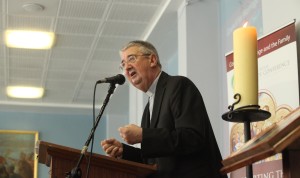
By Sarah Mac Donald - 15 March, 2016

Pic John McElroy
Irish society can be “harsh and unforgiving” as well as lonely if you are on the margins and sad if you are bullied, Archbishop Diarmuid Martin said in Cork on Monday.
In his address on the relevance of Pope Francis’s message for Ireland as it celebrates and commemorates 1916, the Archbishop said marking the centenary shouldn’t be a matter of “lip service to equality” but a matter of being personally in the forefront in identifying and reaching out to those who are marginalised.
Speaking at the Regina Mundi School in Cork at the launch of the Society of Pope Francis, he stated that inclusiveness is not just ensuring that we get what we want.
“It involves reaching out to those who are on the margins, including those fail or fall by the wayside.”
He added that there are so many ways today in which people can become marginalised and forgotten and overlooked in out societies.
“We all fail,” he said and added, “The Christian life according to Pope Francis is not ‘a never falling down’, but ‘an always getting up’, thanks to this hand which catches us.”
Challenging people about the manner in which they celebrate 1916, the Archbishop said it was not achieved by “watching events on television, but getting our hands dirty in helping the marginalised to become fully part of our human family”.
On Pope Francis’ challenge to those who believe to “go out of ourselves”, Archbishop Martin recalled the Pontiff’s description of faith as “revolutionary through an impulse that comes from the Holy Spirit” and that he described the work of the Spirit as “a powerful – and thus at times restless – breath”.
“Each of us has to ask ourselves if we have genuinely kept the restlessness in our hearts alive – as did the leaders in 1916 – or have we often fallen into a life style of conformity and comfort,” the Primate of Ireland challenged.
He added that the restlessness which the Spirit creates in our hearts should make us ever more sensitive to what is wrong in society: whether this is economic or social in its roots.
“We live in a world where there is much inequality, where children do not have the same opportunities not just in different parts of the world, but even in different parts of this nation. We live in a world where there is still corruption and violence and lack of respect for life.”
“People are exploited in many ways and are trafficked and treated as slaves. We live in a world where, alongside great and demonstrative wealth, many have difficulties in making ends meet. We live in a world where we throw away tons of food each week and where we have children coming to school hungry,” he said.
Looking at the Church, he recognised that it has difficulty in reaching out to young people.
“There are also signs within the Catholic Church that some – even young people – are seeking refuge from the challenges of life by adopting ways of the past and are retreating from dialogue with the present into the false security of imaginary better times,” he warned.
But despite all the criticism of the Church, the Archbishop said there is very little doubt that among the most respected categories of people in Irish society today “our local priest” must be in the top five and for good reason.
He added, “I am afraid that ‘the bishops’ as a group may be farther down on the popularity gauge.”
According to Dr Martin, “The Irish Church needs a new generation of strong and articulate lay men and women. It needs a strong laity which is not inward-looking or caught up simply in Church structures and activities, much less in Church politics.”
He said Pope Francis is certainly clear about one thing: to renew itself the Church must reach out and must discern that renewal also within the economic and existential peripheries of our world.
“Conformist Catholicism is not the answer; simply repeating doctrinal formulas is not the answer; an inward-looking Catholicism – liberal or conservative – is not the answer. We need a new generation of Catholic lay men and women who are articulate in understanding their faith and feel called to bring the unique vision which springs from their faith into dialogue with the realities of the world.”
Referring to the history of Irish Nationalism over the years the Archbishop suggested that it has been a history of pluralism and different religious and social views.
“Being true to the dream of 1916 means fostering in Ireland a new pluralism, not one of confrontation, but one where people of different backgrounds and faiths and political views learn to work together for the common good.”
He underlined that people of belief and people with a secular inspiration must learn again to how speak with one another constructively and respect one another.
In a tribute to the men and women of 1916 he said they were people with ideals and a deep personal spiritual inspiration.
“When I call for a new generation of lay Catholics, I am not calling for constant social commentary and criticism. What is required is a generation of young men and women who take up their faith as a leaven within every aspect of society.”
“It is people who dream and then act courageously who change the world. It is not people who sit sniping from the side-lines, even if they may be correct in their criticism. What is more important is a generation of young women and men who reject indifference and who try to change dreams into reality whatever their calling or profession in life.”